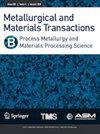Effect of Mold Cooling Intensity on the Depression-Type Crack Formation and Mold Flux Infiltration During Continuous Casting Process
IF 3.1
2区 材料科学
Q3 MATERIALS SCIENCE, MULTIDISCIPLINARY
Metallurgical and Materials Transactions B-Process Metallurgy and Materials Processing Science
Pub Date : 2023-09-15
DOI:10.1007/s11663-023-02911-4
引用次数: 0
Abstract
As one of the most serious defects in the products of continuous casting steel, the surface depressions with longitudinal cracks originated from the mold were clearly characterized. A mold simulator technique was developed to investigate the effects of different mold cooling flow rates (3.5, 6.0, 7.5 L/min) on the evolution of depression-type cracks and mold flux infiltration for the steel continuous casting in this study. The mold simulator results indicated that the depression and longitudinal crack become more serious with the increasing of mold cooling intensities. Furthermore, when the cooling intensity enhanced from 3.5 to 7.5 L/min, the average solidification factor of shell increased rapidly from 2.37 to 2.91 (mm/s)1/2, and the mean heat flux in the initial solidified shells with depressions reduced by 0.723 MW/m2 during the initial 0 to 1.5 seconds solidification stage. In addition, the higher mold cooling intensities of 6.0 to 7.5 L/min could result in an increasing of slag film thickness and the formation of amorphous slag, which contributed to the uneven infiltration of mold flux.结晶器冷却强度对连铸过程中凹型裂纹形成及助焊剂渗透的影响
连铸钢产品中最严重的缺陷之一是由铸型引起的表面凹陷和纵向裂纹。采用结晶器模拟技术,研究了不同冷却流量(3.5、6.0、7.5 L/min)对连铸坯凹型裂纹演化及助熔剂渗透的影响。模具仿真结果表明,随着模具冷却强度的增加,凹痕和纵向裂纹变得越来越严重。当冷却强度从3.5 L/min增加到7.5 L/min时,壳层的平均凝固系数从2.37迅速增加到2.91 (mm/s)1/2,在0 ~ 1.5 s的初始凝固阶段,带凹点的初始凝固壳层的平均热流密度降低了0.723 MW/m2。此外,6.0 ~ 7.5 L/min的高冷却强度会导致渣膜厚度增加,形成无定形渣,导致助焊剂渗透不均匀。
本文章由计算机程序翻译,如有差异,请以英文原文为准。
求助全文
约1分钟内获得全文
求助全文
来源期刊

CiteScore
4.90
自引率
20.00%
发文量
293
审稿时长
4.7 months
期刊介绍:
Focused on process metallurgy and materials processing science, Metallurgical and Materials Transactions B contains only original, critically reviewed research on primary manufacturing processes, from extractive metallurgy to the making of a shape.
A joint publication of ASM International and TMS (The Minerals, Metals and Materials Society), Metallurgical and Materials Transactions B publishes contributions bimonthly on the theoretical and engineering aspects of the processing of metals and other materials, including studies of electro- and physical chemistry, mass transport, modeling and related computer applications.
Articles cover extractive and process metallurgy, pyrometallurgy, hydrometallurgy, electrometallurgy, transport phenomena, process control, physical chemistry, solidification, mechanical working, solid state reactions, composite materials, materials processing and the environment.
 求助内容:
求助内容: 应助结果提醒方式:
应助结果提醒方式:


